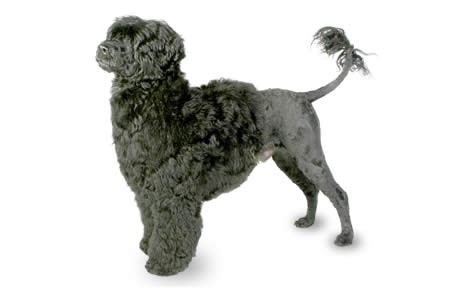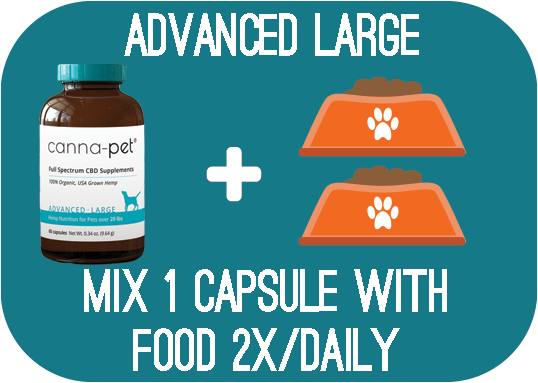Portuguese Water Dog Breed Guide

Breed Group:
Working Dogs
Get 30% off
Join our Newsletter
Sign Up Today
Portuguese Water Dog Background & History
The Portuguese Water Dog is an ancient breed that has existed along the coasts of Portugal for millennia. Like many ancient breeds, the exact roots of the Portuguese Water Dog have been lost in time. What is known is that a breed referred to as a “water dog” was present along the coast of Portugal prior to the advent of Christianity, and was revered by those early seafaring people. The first written evidence of the Portuguese Water Dog appeared in 1297 in the report of a monk recounting a dog, whose description matches the modern Portuguese Water Dog, pulling a drowning man from the sea. Portuguese Water Dogs are known to have been widely spread along the coast of Portugal up until the modern era, when industrialized fishing techniques eliminated their need on boats.
The breed’s name comes from their name in their native Portugal, cao de agua, which is translated to “dog of water.” Portuguese Water Dogs are a working breed that served in a variety of roles along the Portuguese coast. They were trained to herd fish into nets, retrieve lost equipment, and serve as messengers between boats or land. They were also used as guardians of both property and people. By the early 20th century, the breed had all but disappeared in Portugal, and was only saved through the efforts of Vasco Bensaude, a wealthy Portuguese shipping magnate that took an interest in the breed. The breed briefly appeared in England during the 1950’s, but died out relatively quickly. The first Portuguese Water Dog was brought to the United States in 1968, from which point the popularity of the breed has steadily risen.
Portuguese Water Dog Personality & Temperament
Portuguese Water Dog temperaments are fun-loving, energetic and playful. They bond strongly with their family, with which they are extremely affectionate and exceptionally loyal. Their history diving off boats to retrieve nets and assist sailors has left the Portuguese Water Dog with an incredible streak of bravery. This is a hardy breed that can work for hours on end without tiring. They are sensitive and kind, exhibiting an acute sense of their owner’s moods and desires. Overall, the Portuguese Water Dog personality is friendly and affable with other people and animals alike.
Training a Portuguese Water Dog
Portuguese Water Dogs live up to their long history as a working breed and human companion, and they take well to training. Their intelligence combined with their innate sensitivity and desire to please allows them to quickly learn new commands and take well to direction. Because they are sensitive, owners will get the best results using positive reinforcement training. This breed will take scolding and punishment to heart. Portuguese Water Dogs should be socialized from a young age to take advantage of their natural open and friendly nature towards others.
Exercise Requirements for a Portuguese Water Dog
The Portuguese Water Dog has an abundance of energy, a trait that made them such valuable and tireless workers on fishing trawlers for centuries. They will need a long walk, jog, or vigorous play session on a daily basis to be happy and content. As the name implies, the Portuguese Water Dog is an exceptional swimmer, so if you have access to water allowing them a dip in the pool is a great way to burn off some of their energy.
Lifespan & Longevity for the Portuguese Water Dog
Portuguese Water Dogs lifespans are an average of 10-14 years. They are a fairly healthy and hardy breed that lives a long life.
Portuguese Water Dog Breed Popularity
The Portuguese Water Dog is currently ranked as the 51st most popular AKC recognized purebred dog breed. Their popularity is impressive given their relatively recent introduction in the United States and recognition by the AKC in 1983. Their popularity is offset by the fact that they are not well suited for apartment living, although they can do well in urban environments if they are exercised sufficiently.
Feeding Requirements for the Portuguese Water Dog
The Portuguese Water Dog has no special dietary restrictions. This breed will be at its healthiest if it is provided with a high-quality diet. Look for a food that provides a good balance of proteins, healthy fats, and vegetable fillers. Avoid any foods with grain fillers such as corn, soy, or wheat as these are hard to digest and can lead to allergic reactions. Portuguese Water Dogs are a medium sized breed weighing between 35-60lbs, with an energy level far exceeding their size. Expect to feed your Portuguese Water Dog between 2½ and 3½ cups of dry food a day, split into two even meals. If your dog is exceptionally active, you may need to feed them more.
How to Groom a Portuguese Water Dog
Portuguese Water Dogs have high grooming requirements due to their abundance of hair. They should be thoroughly brushed every other day at a minimum, otherwise their hair will mat. They should also be groomed or clipped once every month to maintain the health of their coat. Portuguese Water Dogs are groomed in two styles; a lion cut where the hair is shaved on the rear of the dog, or a retriever cut where the hair is kept about one inch long over the entire body. Portuguese Water Dogs are hypoallergenic which means they will likely not cause allergies. They are also single-coated and do not cause much shedding.
Are Portuguese Water Dogs Good with Children?
Portuguese Water Dogs make great companions for children. They are playful and affectionate, and have the energy levels to play throughout the day. Very young children should be supervised when playing with your dog, as they can be inadvertently knocked over or hurt during play. That being said, the Portuguese Water Dog characteristics exhibit no aggression towards children, and if raised together they will become life-long companions.
Portuguese Water Dog Health Problems
Hip Dysplasia: Canine hip dysplasia is a condition characterized by a malformation in the connection between the femur and pelvis in the hip assembly. This malformation causes a loose connection between the two bones. This loose connection results in uneven wear over time on the cartilage padding the bones. As the cartilage wears down it is replaced with scar tissue and sometimes bone spurs. Late in life, hip dysplasia results in debilitating arthritis that is extremely painful and will eventually result in rear-leg lameness. Hip dysplasia can be assessed at a young age through a physical examination by a veterinarian.
Progressive Retinal Atrophy (PRA): PRA is a degenerative disease that affects the photoreceptor cells within the retina of the dog. Over time these photoreceptor cells begin to die, resulting in a diminished capacity to perceive light. The most common initial sign of PRA is a dog’s inability to distinguish objects in low or dim light. You may notice them bumping into furniture or doorways at night. PRA is a non-reversible condition, meaning that once it has begun it will eventually progress until there is full loss of vision. PRA affects both eyes simultaneously, but is not a painful condition. PRA is an inherited disease, so if you are thinking of adopting or purchasing a Portuguese Water Dog be sure to inquire with your breeder to find out if there is any history of PRA in their line.
Glycogen Storage Disease: Glycogen storage disease, or glycogenesis, is an inherited condition that results in excessive amounts of glycogen in the liver and muscles. This glycogen cannot be effectively broken down into glucose due to the absence of the specific enzymes responsible for this process. Of the different types of glycogen storage disease affecting dogs, Portuguese Water Dogs are affected by type IIIa, which occurs in curly haired retrievers and shepherds. Signs of glycogen storage disease include wasting away of muscles, lack of growth, hypoglycemia (low blood sugar), lethargy, and weakness. Glycogen storage disease typically presents in adolescence, from 6 months to 1 year of age. Unfortunately, there is currently no cure for glycogen storage disease. Glycogen storage disease is genetically inherited, so be sure to inquire with your breeder if there is any history of its appearance in their line.
Juvenile Dilated Cardiomyopathy (JDCM): JDCM is a disease affecting the cardiac muscles in the Portuguese Water Dog. This condition results in weakened muscles of the heart, resulting in difficulty pumping oxygenated blood throughout the body. The weakened heart muscles are required to work harder to pump blood, while also lacking the strength to maintain the normal dimensions of the heart due to internal pressure. The strain placed on the heart often leads to an irregular heartbeat, or arrhythmia, which can lead to sudden death. In later stages, dilated cardiomyopathy leads to congestive heart failure. Portuguese Water Dogs are genetically predisposed towards developing dilated cardiomyopathy from a very young age, and because of this have a poor prognosis when afflicted with this condition. It is believed that this condition in Portuguese Water Dogs is caused by a deficiency in taurine, an amino acid critical to the health of the heart wall and muscle.
Addison’s Disease: Addison’s disease, or hypoadrenocorticism, is a condition where the adrenal gland in affected dogs produces inadequate amounts of the steroids aldosterone and cortisol. These steroids perform a critical regulating function of the body’s organs and systems. Although the exact cause of Addison’s disease is unknown, certain breeds are predisposed towards developing it. Portuguese Water Dogs are one of these breeds. The good news with Addison’s disease is that once diagnosed, it can be treated. Generally, dogs who are treated live long and happy lives. The downside of Addison’s disease is that it is difficult to diagnose because its shared symptoms with many other conditions. Signs your dog may be suffering from Addison’s disease include vomiting, diarrhea, muscle spasms, lethargy, and muscle weakness.
Other Resources
national breed website: Portuguese Water Dog Club of America
rescues: Portuguese Water Dog Rescue





